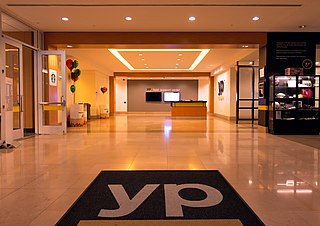
GTE Corporation, formerly General Telephone & Electronics Corporation (1955–1982), was the largest independent telephone company in the United States during the days of the Bell System. The company operated from 1926, with roots tracing further back than that, until 2000, when it was acquired by Bell Atlantic; the combined company took the name Verizon.
AT&T Teleholdings, Inc., formerly known as Ameritech Corporation, is an American telecommunications company that arose out of the 1984 AT&T divestiture. Ameritech was one of the seven Regional Bell Operating Companies that was created following the breakup of the Bell System. Ameritech was acquired in 1999 by SBC Communications, which subsequently acquired AT&T Corporation in 2006, becoming the present-day AT&T Inc.
BellSouth, LLC is an American telecommunications holding company based in Atlanta, Georgia. BellSouth was one of the seven original Regional Bell Operating Companies after the U.S. Department of Justice forced the American Telephone & Telegraph Company to divest itself of its regional telephone companies on January 1, 1984.
Pacific Telesis Group was one of the seven Regional Bell Operating Companies, sometimes also referred to as "RBOCs" or "Baby Bells", created in 1983 in preparation of the breakup of AT&T as a holding company for Pacific Bell and Nevada Bell, Pacific Telesis International and several other non-regulated companies including PacTel Mobile Services and PacTel InfoSystems. It was acquired by SBC Communications in 1997.
Cellular One is the trademarked brand name that licenses services used by several cellular service providers in the United States. The brand was sold to Trilogy Partners by AT&T in 2008 shortly after AT&T had completed its acquisition of Dobson Communications. Cellular One was originally the trade name of one of the first mobile telephone service providers.

The breakup of the Bell System was mandated on January 8, 1982 by an agreed consent decree providing that AT&T Corporation would, as had been initially proposed by AT&T, relinquish control of the Bell Operating Companies that had provided local telephone service in the United States and Canada up until that point. This effectively took the monopoly that was the Bell System and split it into entirely separate companies that would continue to provide telephone service. AT&T would continue to be a provider of long-distance service, while the now-independent Regional Bell Operating Companies (RBOCs), nicknamed the 'Baby Bells', would provide local service, and would no longer be directly supplied with equipment from AT&T subsidiary Western Electric.
AT&T Intellectual Property I, L.P. is one of the holding companies used for AT&T, Inc.'s trademarks & intellectual property assets. Formerly known as AT&T Knowledge Ventures, L.P., SBC Knowledge Ventures, L.P., and, before 2004, SBC Properties, L.P., the trademark holding was formed in late 2002, when the SBC name was added to the beginning of the names of its telephone companies.

Michigan Bell is the subsidiary of AT&T serving the state of Michigan. Following the Bell System divestiture on January 8, 1984, the company became a subsidiary of Ameritech, the Regional Bell operating company that served the midwestern United States. Ameritech was subsequently acquired by SBC Communications, which later changed its name to AT&T.

Illinois Bell Telephone Company, LLC is the Bell Operating Company serving Illinois. It is owned by AT&T through AT&T Teleholdings, formerly Ameritech.
The Ohio Bell Telephone Company, now doing business as AT&T Ohio, is the Bell Operating Company serving most of Ohio and parts of West Virginia. It is a wholly owned subsidiary of AT&T.

Indiana Bell Telephone Company, Incorporated, is the Bell Operating Company serving Indiana. It is an indirect subsidiary of AT&T Inc., owned by AT&T Teleholdings.

Wisconsin Bell, Inc. is the name of the Bell Operating Company serving Wisconsin. It is owned by AT&T through AT&T Teleholdings, originally known as Ameritech.

YP Holdings, now a wholly owned subsidiary of DexYP, is the American parent company for YP LLC. Its products include printed telephone directories, yp.com and YP app. YP offers local search, display ads and direct marketing. On July 31, 2012, YP was included in PaidContent50's list of "the world's most successful digital media companies" based on 2011 digital ad revenue.
YP Texas Region Yellow Pages LLC is a division of YP Holdings that publishes telephone directories to Southwestern Bell customers for AT&T.
SBC Long Distance LLC is a long-distance telephone company owned by AT&T that does business as AT&T Long Distance. SBC Long Distance competes with other long-distance providers who provide service within some of the Bell Operating Company service boundaries of AT&T. SBC Long Distance is a separate subsidiary than AT&T Communications, the incumbent long-distance carrier for most of the country acquired in the SBC merger with AT&T.

Dex One Corporation was an American marketing company providing online, mobile and print search marketing via their DexKnows.com website, print yellow pages directories and pay-per-click ad networks in the U.S.
YP Midwest Publishing LLC., originally Ameritech Publishing, Inc., was formed in 1983 during the Bell System Divestiture. It combined the former directory operations of Illinois Bell, Indiana Bell, Michigan Bell, Ohio Bell and Wisconsin Telephone. Ameritech Publishing published telephone directories in Indiana, Ohio, Michigan, and Wisconsin. Directories in Illinois were made in a joint venture with R. H. Donnelley.

The Bell System was the system of companies, led by the Bell Telephone Company and later by AT&T, that dominated the telephone services industry in North America for 100 years from its creation in 1877 until its demise in the early 1980s. The system of companies was often colloquially called Ma Bell, as it held a near-complete monopoly over telephone service in most areas of the United States and Canada. At the time of its breakup in the early 1980s, the Bell System had assets of $150 billion and employed over one million people.

AT&T Corporation, originally the American Telephone and Telegraph Company, is the subsidiary of AT&T Inc. that provides voice, video, data, and Internet telecommunications and professional services to businesses, consumers, and government agencies.

Southwestern Bell Telephone Company is a wholly owned subsidiary of AT&T. It does business as other d/b/a names in its operating region, which includes Arkansas, Kansas, Missouri, Oklahoma, Texas, and portions of Illinois.









